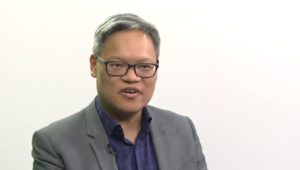
China’s leadership is still trying to figure out how to deal with US president Donald Trump. Making sense out of Trump has been harder than expected, says political analyst Victor Shih, author of Factions and Finance in China. in an extensive interview in the New Yorker.
The New Yorker:
What have you made of the way the Party, generally, and Xi himself, in his personal interactions, has tried to deal with Trump over the last two and a half years?
I think China suffers from a deficit of true expertise about the U.S. You have these very establishment experts who focus on the Presidency. So you can randomly pick a U.S. expert among the Chinese, and they will know a lot about what President Clinton did, what President Bush did, etc. But they have very little knowledge about interactions between Congress and the executive branch, and very, very little knowledge about interactions between businesses and the executive branch. So I think what they looked at was the electoral map, and they said, “Well, look at these states that elected Trump. They’re all agricultural states. So we’re going to go after agriculture if things between the U.S. and China were to worsen.” What they didn’t realize is that, actually, agricultural subsidies are the one subsidy that, across the aisle, members of Congress actually support. And so, lo and behold, after China punished the U.S. by not buying soybeans and corn, that was easily dealt with by additional agricultural subsidies, and I think that was kind of a surprise to the Chinese side.
So they have a simplistic view of the U.S., but I think this trade war has educated China on many facets of the U.S. system. But still, I think the expertise is kind of lacking.
Do you have some sense of what the Party makes of Trump personally?
On the one hand, they do see this very typical real-estate billionaire, of whom there are many, obviously, in China. The regime is filled with real-estate billionaires—selfish, egotistical, money-hungry. These are all patterns that are very familiar to the Chinese government. But, on the other hand, I think they have been very surprised that doing things like granting Ivanka Trump’s brand copyrights in China, really playing up to Trump’s ego, have not been enough. You have to remember that there was this kind of honeymoon period at the beginning when Xi Jinping visited Mar-a-Lago, et cetera. I think that they were very surprised at how sincere the nationalist rhetoric, the anti-Chinese trade rhetoric, turned out to be.
They made the same mistake that a lot of people made, which is, Trump obviously doesn’t give a shit about all kinds of things. But on certain things—
Well, exactly. They thought that ego and money, and the promise of money, would have been enough to at least soften some of his rhetoric against China and trade with China. But it has not done that as much as they had expected.
Have I made the same mistake that you were saying a lot of Chinese observers of the U.S. make, by focussing too much on the leader and not focussing enough on Party dynamics?
One should not just focus on him. But I think, in terms of political dynamics, probably just him. The problem faced by Xi is the same one that is faced by Trump, which is that they’re not economic experts. Trump can say, “I’ve been a business person.” In a weird way, I’d argue that Trump actually knows more about economics, how the market works, how the financial markets work, than Xi Jinping, who has lived his entire life under the care of the Chinese government and an entirely socialist internal economy, which still persists within the Chinese government. When you are an official in the Chinese government, your meals come from the government; salary and housing is allocated by the government. He really does not have a lot of intuition about how the market works, until the small group of trusted advisers around him and their advice becomes important.
So I think it is right that people are focussing on Liu He, one of the technocrats that Xi Jinping trusts a great deal, because they go way back to high school. But for Liu He, there’s still a challenge. Even though he’s trusted, he’s listened to, if he makes a mistake, that trust also can go away. So Liu He is desperately trying not to make a mistake. It’s possible that, given all these other objectives of national greatness, and not having a financial crisis, Liu He may be a true moderating voice in trying to persuade Xi Jinping to make certain concessions. That’s the propaganda line that you see, but it’s possible that it’s true in reality.
Victor Shih is a speaker at the China Speakers Bureau. Do you need him at your meeting or conference? Do get in touch or fill in our speakers’ request form.
Are you looking for more experts on the ongoing trade war between China and the US? Do check out this list.
